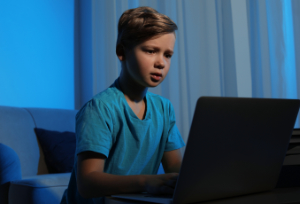Kids are using the Internet more than ever before on desktops, laptops, and mobile devices, especially as online learning has become more prevalent. Internet safety is an important topic to discuss with kids so they're aware of the potential dangers of Internet use. Parents should also use tools such as parental controls and privacy settings to keep kids safe.
Digital Cleanse
A digital cleanse is a process of detaching from electronic devices that are connected to the Internet. The purpose of a digital cleanse is to focus on in-person interactions and reduce sources of stress. If electronic devices have become too much a part of daily life, a digital cleanse can be useful for breaking negative behavior patterns. The extra time not spent on electronic devices can make it possible to focus on enjoying nature, exercising, meditating, and spending time with family and friends.
- Ten-Step Guide to Doing a Digital Detox
- Five Ways to Do a Digital Detox
- Five Signs You Need a Technology Detox
- The Benefits of a Digital Detox
- Why We All Need a Digital Detox
- Five Ways to Do a Digital Detox
Privacy Settings, Parental Controls, and Passwords
Privacy settings, parental controls, and strong passwords are important tools to keep kids safe online and information safe in general. Use parental controls on computers and mobile devices to manage the types of websites that kids can access, the things they can download and purchase, and the amount of time they can spend on the Internet. Some websites have privacy settings that enable you to manage the personal information that is saved online and the information that others can see. Always use strong passwords with symbols, numbers, uppercase letters, and lowercase letters to keep computers, devices, and online accounts secure.
- Protect Your Kids: Set Up Parental Controls
- How to Set Security Settings on Your Child's Mobile Device
- Setting Up Parental Controls for Android Phones
- How to Set Parental Controls on All of Your Devices
Protecting Personal Information
Keeping personal information secure online requires diligence about where and how you share it. Always check the security of a website before you disclose personal information. Look for a lock icon in the status bar of the Internet browser, which indicates that a site is secure. Don't share sensitive information such as bank account numbers or Social Security numbers via email. Always use strong passwords when setting up online accounts, and never share these passwords with anyone. Teach kids to avoid oversharing information on social media networks, and keep privacy settings secure to limit other users' access to the information that is shared.
- How to Keep Your Personal Information Secure
- How Do You Protect Your Personal Information Online?
- How to Protect Your Privacy Online
- Data Protection Tips: How to Keep Your Personal Information Safe
Social Media and Cyberbullying
Cyberbullying is a type of bullying that occurs online. Cyberbullying can happen on social media platforms, on instant messaging or gaming platforms, by email, and on mobile devices by text-messaging. Any type of activity that involves shaming, provocation, or fear tactics is considered cyberbullying. Spreading lies or rumors with words or photos, sending hurtful messages, and impersonating someone are also forms of cyberbullying. If cyberbullying occurs, it needs to be reported immediately to the platform, to school administrators, and to the police.
- Facts About Bullying
- Most Teens Have Experienced Cyberbullying
- Cyberbullying Statistics
- Cyberbullying and Social Media
- Cyberbullying: What it Is and How to Stop It
Establishing Rules
Kids need rules limiting how they use electronic devices and the Internet. Teach kids never to disclose personal information such as addresses and telephone numbers to anyone on the Internet. Kids also need to know the dangers of agreeing to get together with anyone they meet online. Make a rule that kids must check with parents before uploading photos to ensure that the photos are appropriate. Kids should also tell a parent right away if anything happens online that makes them uncomfortable. Check their online activity from time to time to make sure all is well.

